Report on the Economic Consequences of the GCC Blockade on Qatar
VerifiedAdded on 2023/06/03
|9
|2660
|69
Report
AI Summary
This report examines the economic consequences of the GCC blockade imposed on Qatar in 2017 by Saudi Arabia, UAE, Bahrain, and Egypt. The blockade led to an initial contraction of Qatar's economy, affecting bilateral trade and GDP growth. While Qatar has shown some signs of recovery, challenges remain in its banking sector and overall economic stability. The report also discusses the geopolitical tensions and their impact on foreign investment and military spending in the region. It recommends diplomatic talks and cooperation among GCC members to resolve the issues and ensure future economic prosperity. The analysis draws on secondary data and recent developments to provide a comprehensive overview of the situation. Desklib provides past papers and solved assignments for students.
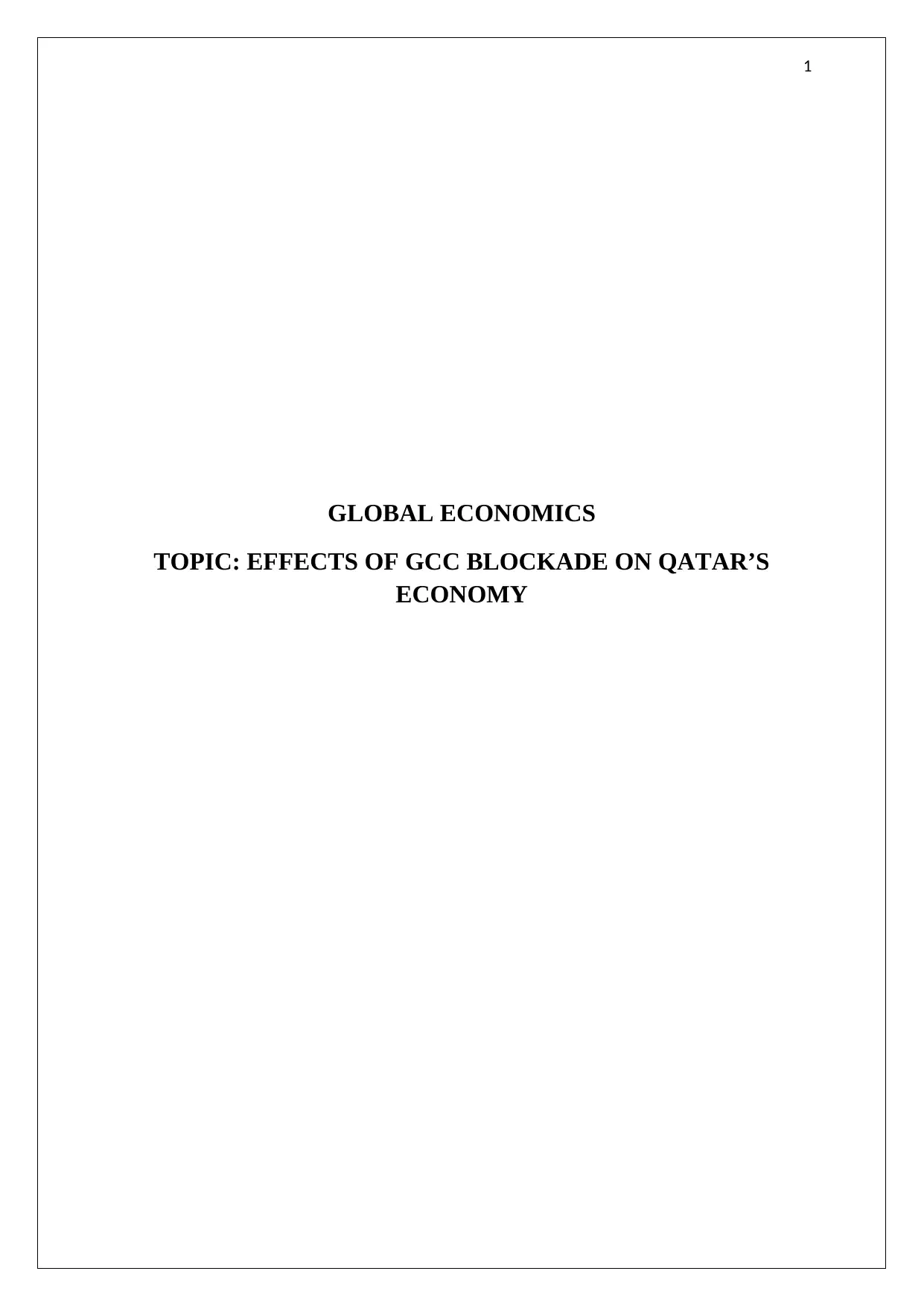
1
GLOBAL ECONOMICS
TOPIC: EFFECTS OF GCC BLOCKADE ON QATAR’S
ECONOMY
GLOBAL ECONOMICS
TOPIC: EFFECTS OF GCC BLOCKADE ON QATAR’S
ECONOMY
Paraphrase This Document
Need a fresh take? Get an instant paraphrase of this document with our AI Paraphraser
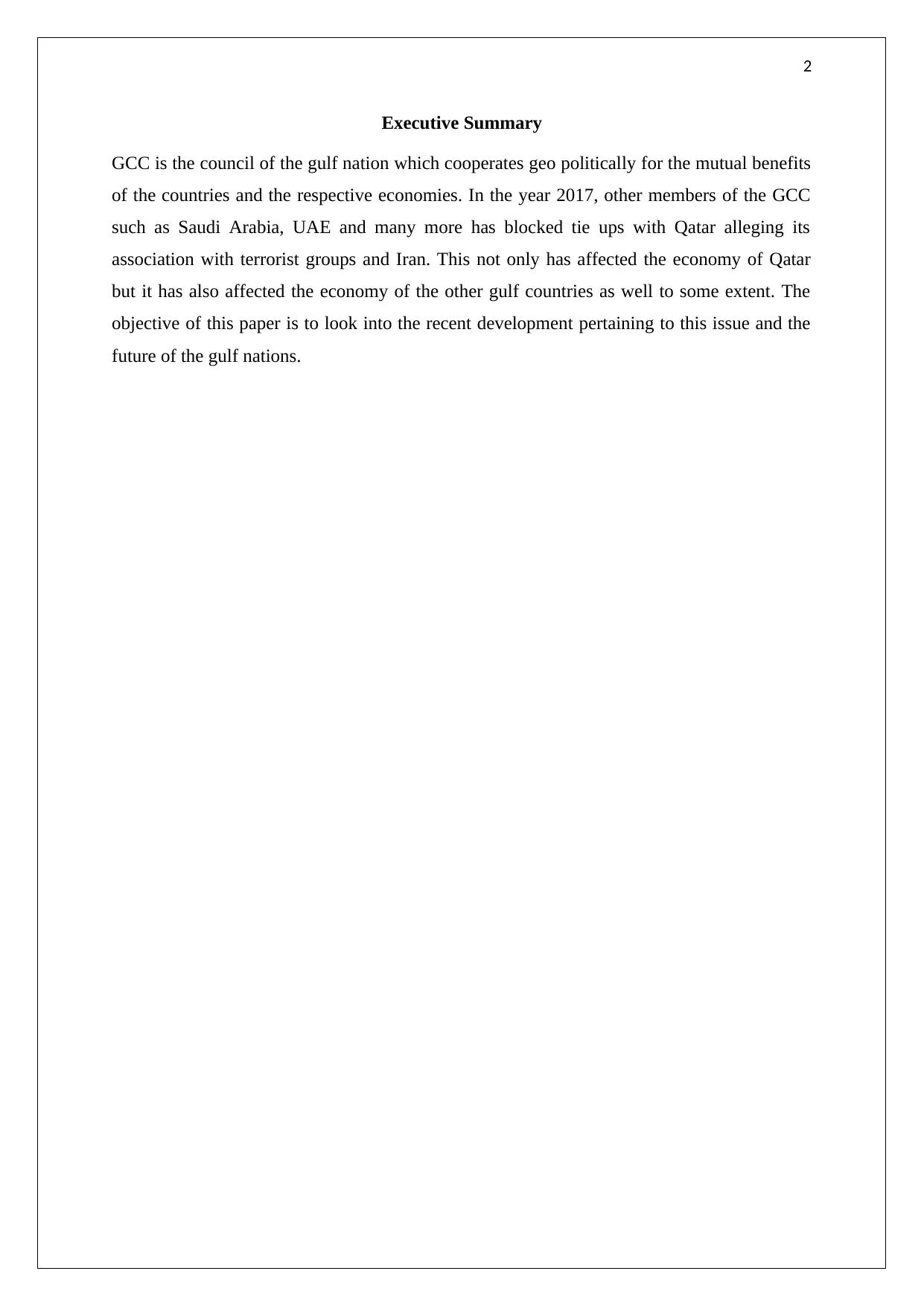
2
Executive Summary
GCC is the council of the gulf nation which cooperates geo politically for the mutual benefits
of the countries and the respective economies. In the year 2017, other members of the GCC
such as Saudi Arabia, UAE and many more has blocked tie ups with Qatar alleging its
association with terrorist groups and Iran. This not only has affected the economy of Qatar
but it has also affected the economy of the other gulf countries as well to some extent. The
objective of this paper is to look into the recent development pertaining to this issue and the
future of the gulf nations.
Executive Summary
GCC is the council of the gulf nation which cooperates geo politically for the mutual benefits
of the countries and the respective economies. In the year 2017, other members of the GCC
such as Saudi Arabia, UAE and many more has blocked tie ups with Qatar alleging its
association with terrorist groups and Iran. This not only has affected the economy of Qatar
but it has also affected the economy of the other gulf countries as well to some extent. The
objective of this paper is to look into the recent development pertaining to this issue and the
future of the gulf nations.
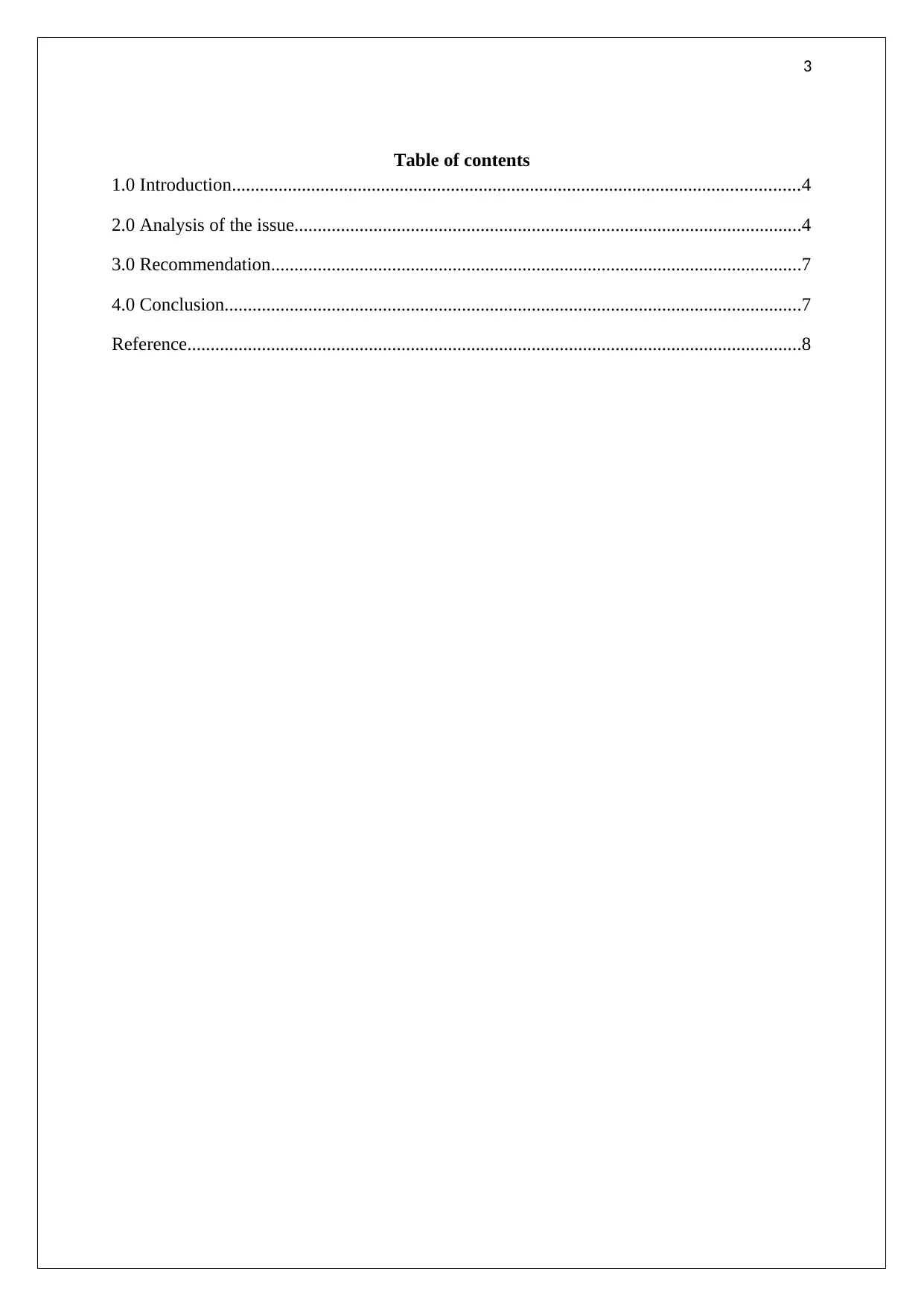
3
Table of contents
1.0 Introduction..........................................................................................................................4
2.0 Analysis of the issue.............................................................................................................4
3.0 Recommendation..................................................................................................................7
4.0 Conclusion............................................................................................................................7
Reference....................................................................................................................................8
Table of contents
1.0 Introduction..........................................................................................................................4
2.0 Analysis of the issue.............................................................................................................4
3.0 Recommendation..................................................................................................................7
4.0 Conclusion............................................................................................................................7
Reference....................................................................................................................................8
⊘ This is a preview!⊘
Do you want full access?
Subscribe today to unlock all pages.

Trusted by 1+ million students worldwide
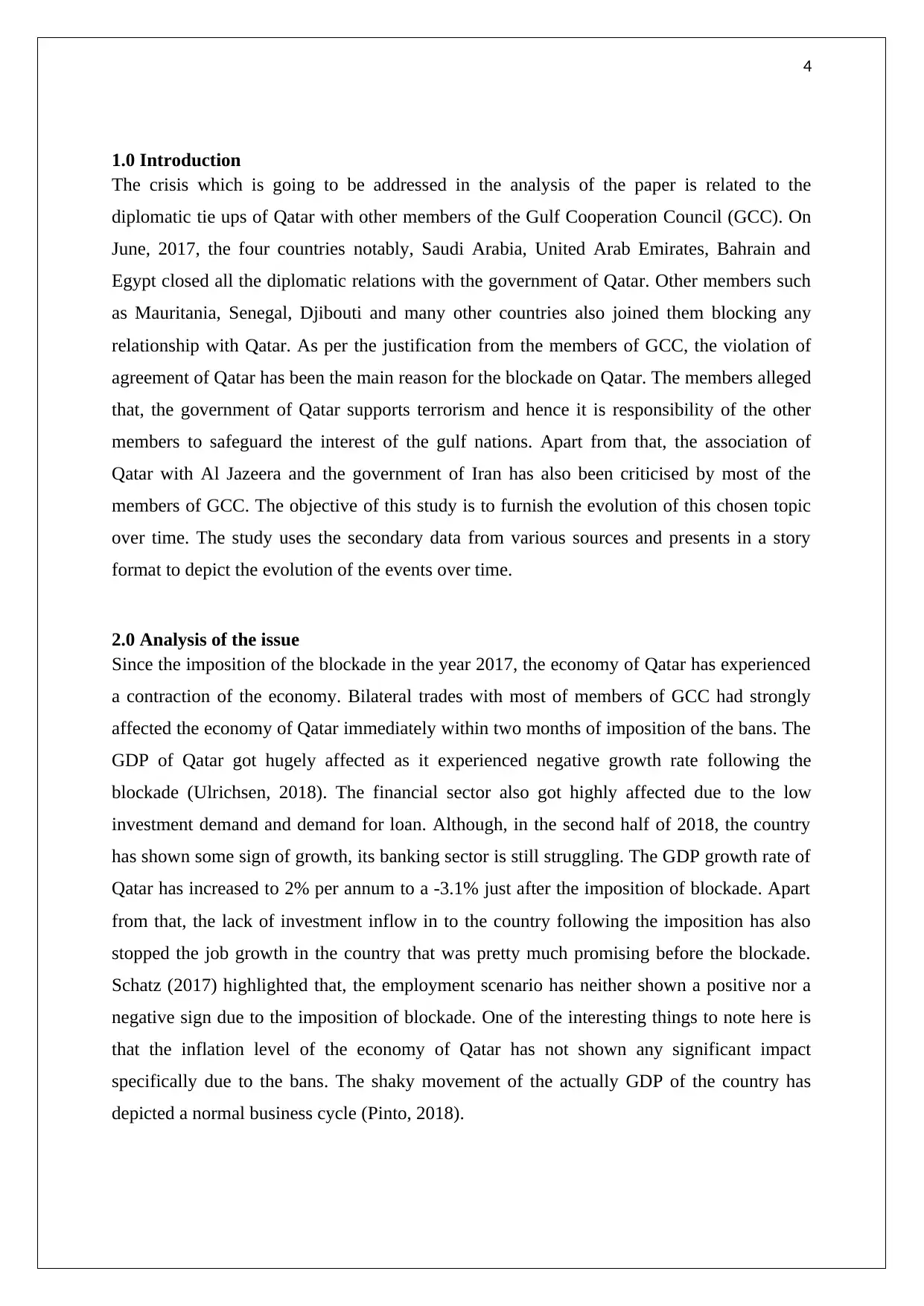
4
1.0 Introduction
The crisis which is going to be addressed in the analysis of the paper is related to the
diplomatic tie ups of Qatar with other members of the Gulf Cooperation Council (GCC). On
June, 2017, the four countries notably, Saudi Arabia, United Arab Emirates, Bahrain and
Egypt closed all the diplomatic relations with the government of Qatar. Other members such
as Mauritania, Senegal, Djibouti and many other countries also joined them blocking any
relationship with Qatar. As per the justification from the members of GCC, the violation of
agreement of Qatar has been the main reason for the blockade on Qatar. The members alleged
that, the government of Qatar supports terrorism and hence it is responsibility of the other
members to safeguard the interest of the gulf nations. Apart from that, the association of
Qatar with Al Jazeera and the government of Iran has also been criticised by most of the
members of GCC. The objective of this study is to furnish the evolution of this chosen topic
over time. The study uses the secondary data from various sources and presents in a story
format to depict the evolution of the events over time.
2.0 Analysis of the issue
Since the imposition of the blockade in the year 2017, the economy of Qatar has experienced
a contraction of the economy. Bilateral trades with most of members of GCC had strongly
affected the economy of Qatar immediately within two months of imposition of the bans. The
GDP of Qatar got hugely affected as it experienced negative growth rate following the
blockade (Ulrichsen, 2018). The financial sector also got highly affected due to the low
investment demand and demand for loan. Although, in the second half of 2018, the country
has shown some sign of growth, its banking sector is still struggling. The GDP growth rate of
Qatar has increased to 2% per annum to a -3.1% just after the imposition of blockade. Apart
from that, the lack of investment inflow in to the country following the imposition has also
stopped the job growth in the country that was pretty much promising before the blockade.
Schatz (2017) highlighted that, the employment scenario has neither shown a positive nor a
negative sign due to the imposition of blockade. One of the interesting things to note here is
that the inflation level of the economy of Qatar has not shown any significant impact
specifically due to the bans. The shaky movement of the actually GDP of the country has
depicted a normal business cycle (Pinto, 2018).
1.0 Introduction
The crisis which is going to be addressed in the analysis of the paper is related to the
diplomatic tie ups of Qatar with other members of the Gulf Cooperation Council (GCC). On
June, 2017, the four countries notably, Saudi Arabia, United Arab Emirates, Bahrain and
Egypt closed all the diplomatic relations with the government of Qatar. Other members such
as Mauritania, Senegal, Djibouti and many other countries also joined them blocking any
relationship with Qatar. As per the justification from the members of GCC, the violation of
agreement of Qatar has been the main reason for the blockade on Qatar. The members alleged
that, the government of Qatar supports terrorism and hence it is responsibility of the other
members to safeguard the interest of the gulf nations. Apart from that, the association of
Qatar with Al Jazeera and the government of Iran has also been criticised by most of the
members of GCC. The objective of this study is to furnish the evolution of this chosen topic
over time. The study uses the secondary data from various sources and presents in a story
format to depict the evolution of the events over time.
2.0 Analysis of the issue
Since the imposition of the blockade in the year 2017, the economy of Qatar has experienced
a contraction of the economy. Bilateral trades with most of members of GCC had strongly
affected the economy of Qatar immediately within two months of imposition of the bans. The
GDP of Qatar got hugely affected as it experienced negative growth rate following the
blockade (Ulrichsen, 2018). The financial sector also got highly affected due to the low
investment demand and demand for loan. Although, in the second half of 2018, the country
has shown some sign of growth, its banking sector is still struggling. The GDP growth rate of
Qatar has increased to 2% per annum to a -3.1% just after the imposition of blockade. Apart
from that, the lack of investment inflow in to the country following the imposition has also
stopped the job growth in the country that was pretty much promising before the blockade.
Schatz (2017) highlighted that, the employment scenario has neither shown a positive nor a
negative sign due to the imposition of blockade. One of the interesting things to note here is
that the inflation level of the economy of Qatar has not shown any significant impact
specifically due to the bans. The shaky movement of the actually GDP of the country has
depicted a normal business cycle (Pinto, 2018).
Paraphrase This Document
Need a fresh take? Get an instant paraphrase of this document with our AI Paraphraser
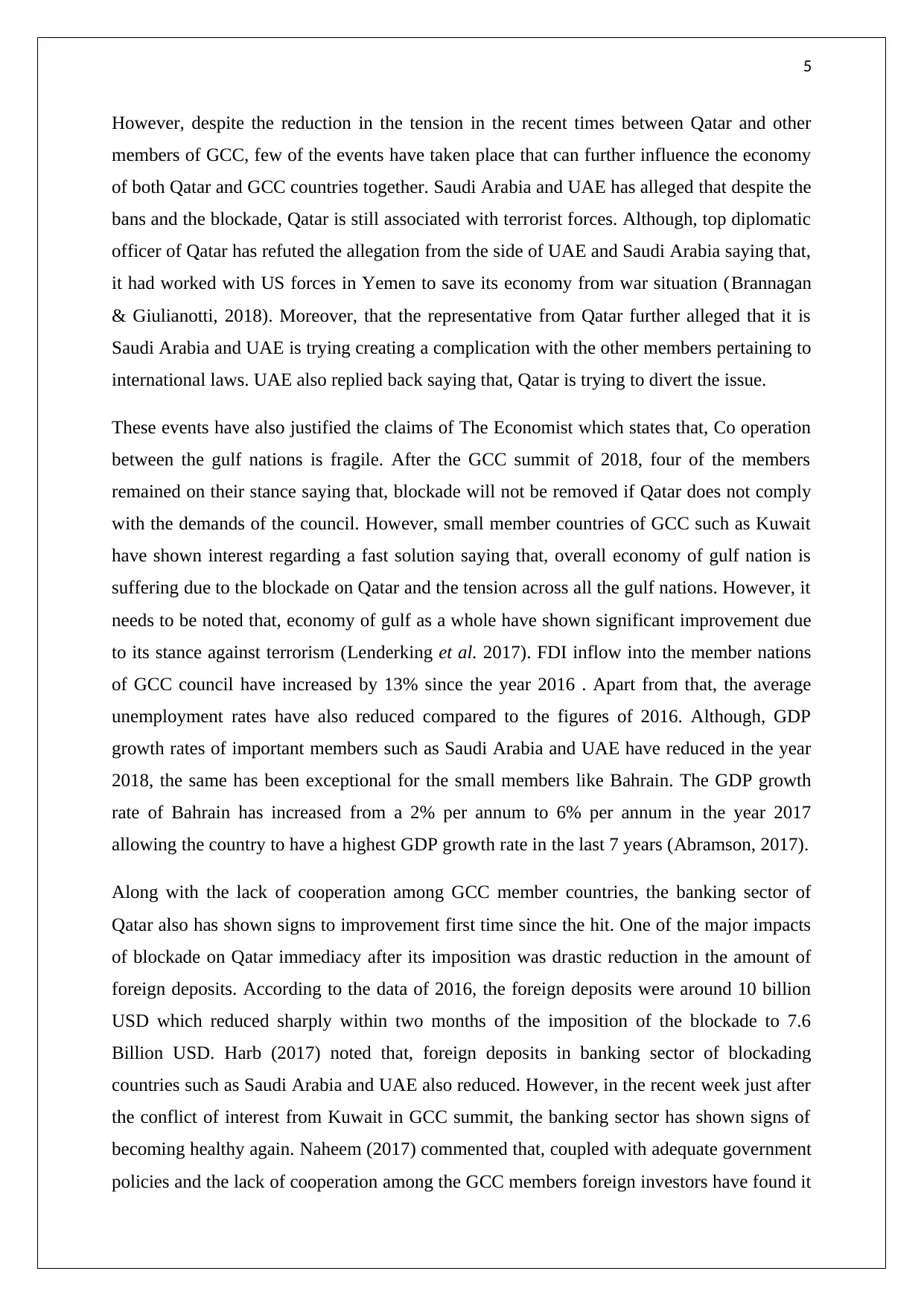
5
However, despite the reduction in the tension in the recent times between Qatar and other
members of GCC, few of the events have taken place that can further influence the economy
of both Qatar and GCC countries together. Saudi Arabia and UAE has alleged that despite the
bans and the blockade, Qatar is still associated with terrorist forces. Although, top diplomatic
officer of Qatar has refuted the allegation from the side of UAE and Saudi Arabia saying that,
it had worked with US forces in Yemen to save its economy from war situation (Brannagan
& Giulianotti, 2018). Moreover, that the representative from Qatar further alleged that it is
Saudi Arabia and UAE is trying creating a complication with the other members pertaining to
international laws. UAE also replied back saying that, Qatar is trying to divert the issue.
These events have also justified the claims of The Economist which states that, Co operation
between the gulf nations is fragile. After the GCC summit of 2018, four of the members
remained on their stance saying that, blockade will not be removed if Qatar does not comply
with the demands of the council. However, small member countries of GCC such as Kuwait
have shown interest regarding a fast solution saying that, overall economy of gulf nation is
suffering due to the blockade on Qatar and the tension across all the gulf nations. However, it
needs to be noted that, economy of gulf as a whole have shown significant improvement due
to its stance against terrorism (Lenderking et al. 2017). FDI inflow into the member nations
of GCC council have increased by 13% since the year 2016 . Apart from that, the average
unemployment rates have also reduced compared to the figures of 2016. Although, GDP
growth rates of important members such as Saudi Arabia and UAE have reduced in the year
2018, the same has been exceptional for the small members like Bahrain. The GDP growth
rate of Bahrain has increased from a 2% per annum to 6% per annum in the year 2017
allowing the country to have a highest GDP growth rate in the last 7 years (Abramson, 2017).
Along with the lack of cooperation among GCC member countries, the banking sector of
Qatar also has shown signs to improvement first time since the hit. One of the major impacts
of blockade on Qatar immediacy after its imposition was drastic reduction in the amount of
foreign deposits. According to the data of 2016, the foreign deposits were around 10 billion
USD which reduced sharply within two months of the imposition of the blockade to 7.6
Billion USD. Harb (2017) noted that, foreign deposits in banking sector of blockading
countries such as Saudi Arabia and UAE also reduced. However, in the recent week just after
the conflict of interest from Kuwait in GCC summit, the banking sector has shown signs of
becoming healthy again. Naheem (2017) commented that, coupled with adequate government
policies and the lack of cooperation among the GCC members foreign investors have found it
However, despite the reduction in the tension in the recent times between Qatar and other
members of GCC, few of the events have taken place that can further influence the economy
of both Qatar and GCC countries together. Saudi Arabia and UAE has alleged that despite the
bans and the blockade, Qatar is still associated with terrorist forces. Although, top diplomatic
officer of Qatar has refuted the allegation from the side of UAE and Saudi Arabia saying that,
it had worked with US forces in Yemen to save its economy from war situation (Brannagan
& Giulianotti, 2018). Moreover, that the representative from Qatar further alleged that it is
Saudi Arabia and UAE is trying creating a complication with the other members pertaining to
international laws. UAE also replied back saying that, Qatar is trying to divert the issue.
These events have also justified the claims of The Economist which states that, Co operation
between the gulf nations is fragile. After the GCC summit of 2018, four of the members
remained on their stance saying that, blockade will not be removed if Qatar does not comply
with the demands of the council. However, small member countries of GCC such as Kuwait
have shown interest regarding a fast solution saying that, overall economy of gulf nation is
suffering due to the blockade on Qatar and the tension across all the gulf nations. However, it
needs to be noted that, economy of gulf as a whole have shown significant improvement due
to its stance against terrorism (Lenderking et al. 2017). FDI inflow into the member nations
of GCC council have increased by 13% since the year 2016 . Apart from that, the average
unemployment rates have also reduced compared to the figures of 2016. Although, GDP
growth rates of important members such as Saudi Arabia and UAE have reduced in the year
2018, the same has been exceptional for the small members like Bahrain. The GDP growth
rate of Bahrain has increased from a 2% per annum to 6% per annum in the year 2017
allowing the country to have a highest GDP growth rate in the last 7 years (Abramson, 2017).
Along with the lack of cooperation among GCC member countries, the banking sector of
Qatar also has shown signs to improvement first time since the hit. One of the major impacts
of blockade on Qatar immediacy after its imposition was drastic reduction in the amount of
foreign deposits. According to the data of 2016, the foreign deposits were around 10 billion
USD which reduced sharply within two months of the imposition of the blockade to 7.6
Billion USD. Harb (2017) noted that, foreign deposits in banking sector of blockading
countries such as Saudi Arabia and UAE also reduced. However, in the recent week just after
the conflict of interest from Kuwait in GCC summit, the banking sector has shown signs of
becoming healthy again. Naheem (2017) commented that, coupled with adequate government
policies and the lack of cooperation among the GCC members foreign investors have found it
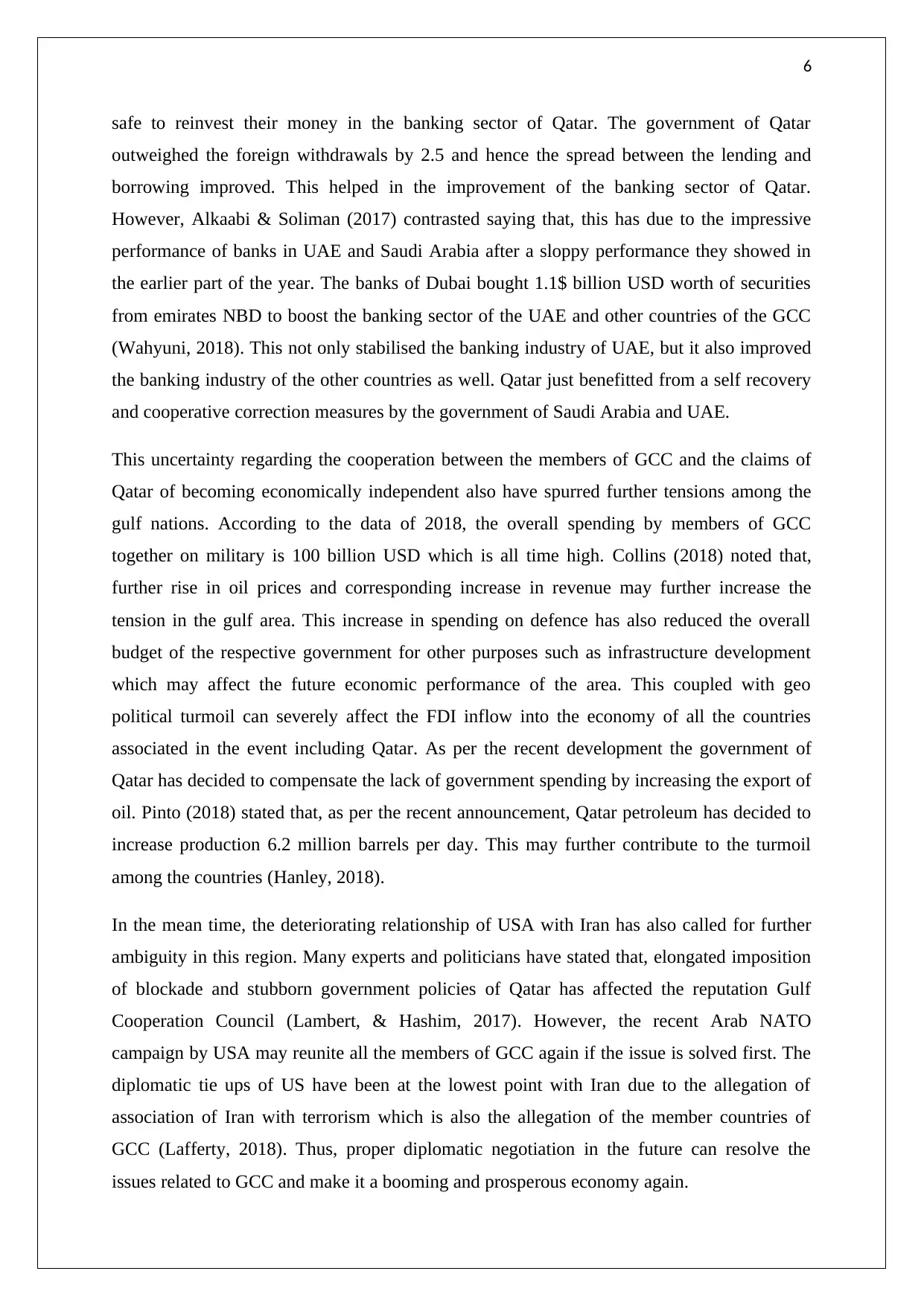
6
safe to reinvest their money in the banking sector of Qatar. The government of Qatar
outweighed the foreign withdrawals by 2.5 and hence the spread between the lending and
borrowing improved. This helped in the improvement of the banking sector of Qatar.
However, Alkaabi & Soliman (2017) contrasted saying that, this has due to the impressive
performance of banks in UAE and Saudi Arabia after a sloppy performance they showed in
the earlier part of the year. The banks of Dubai bought 1.1$ billion USD worth of securities
from emirates NBD to boost the banking sector of the UAE and other countries of the GCC
(Wahyuni, 2018). This not only stabilised the banking industry of UAE, but it also improved
the banking industry of the other countries as well. Qatar just benefitted from a self recovery
and cooperative correction measures by the government of Saudi Arabia and UAE.
This uncertainty regarding the cooperation between the members of GCC and the claims of
Qatar of becoming economically independent also have spurred further tensions among the
gulf nations. According to the data of 2018, the overall spending by members of GCC
together on military is 100 billion USD which is all time high. Collins (2018) noted that,
further rise in oil prices and corresponding increase in revenue may further increase the
tension in the gulf area. This increase in spending on defence has also reduced the overall
budget of the respective government for other purposes such as infrastructure development
which may affect the future economic performance of the area. This coupled with geo
political turmoil can severely affect the FDI inflow into the economy of all the countries
associated in the event including Qatar. As per the recent development the government of
Qatar has decided to compensate the lack of government spending by increasing the export of
oil. Pinto (2018) stated that, as per the recent announcement, Qatar petroleum has decided to
increase production 6.2 million barrels per day. This may further contribute to the turmoil
among the countries (Hanley, 2018).
In the mean time, the deteriorating relationship of USA with Iran has also called for further
ambiguity in this region. Many experts and politicians have stated that, elongated imposition
of blockade and stubborn government policies of Qatar has affected the reputation Gulf
Cooperation Council (Lambert, & Hashim, 2017). However, the recent Arab NATO
campaign by USA may reunite all the members of GCC again if the issue is solved first. The
diplomatic tie ups of US have been at the lowest point with Iran due to the allegation of
association of Iran with terrorism which is also the allegation of the member countries of
GCC (Lafferty, 2018). Thus, proper diplomatic negotiation in the future can resolve the
issues related to GCC and make it a booming and prosperous economy again.
safe to reinvest their money in the banking sector of Qatar. The government of Qatar
outweighed the foreign withdrawals by 2.5 and hence the spread between the lending and
borrowing improved. This helped in the improvement of the banking sector of Qatar.
However, Alkaabi & Soliman (2017) contrasted saying that, this has due to the impressive
performance of banks in UAE and Saudi Arabia after a sloppy performance they showed in
the earlier part of the year. The banks of Dubai bought 1.1$ billion USD worth of securities
from emirates NBD to boost the banking sector of the UAE and other countries of the GCC
(Wahyuni, 2018). This not only stabilised the banking industry of UAE, but it also improved
the banking industry of the other countries as well. Qatar just benefitted from a self recovery
and cooperative correction measures by the government of Saudi Arabia and UAE.
This uncertainty regarding the cooperation between the members of GCC and the claims of
Qatar of becoming economically independent also have spurred further tensions among the
gulf nations. According to the data of 2018, the overall spending by members of GCC
together on military is 100 billion USD which is all time high. Collins (2018) noted that,
further rise in oil prices and corresponding increase in revenue may further increase the
tension in the gulf area. This increase in spending on defence has also reduced the overall
budget of the respective government for other purposes such as infrastructure development
which may affect the future economic performance of the area. This coupled with geo
political turmoil can severely affect the FDI inflow into the economy of all the countries
associated in the event including Qatar. As per the recent development the government of
Qatar has decided to compensate the lack of government spending by increasing the export of
oil. Pinto (2018) stated that, as per the recent announcement, Qatar petroleum has decided to
increase production 6.2 million barrels per day. This may further contribute to the turmoil
among the countries (Hanley, 2018).
In the mean time, the deteriorating relationship of USA with Iran has also called for further
ambiguity in this region. Many experts and politicians have stated that, elongated imposition
of blockade and stubborn government policies of Qatar has affected the reputation Gulf
Cooperation Council (Lambert, & Hashim, 2017). However, the recent Arab NATO
campaign by USA may reunite all the members of GCC again if the issue is solved first. The
diplomatic tie ups of US have been at the lowest point with Iran due to the allegation of
association of Iran with terrorism which is also the allegation of the member countries of
GCC (Lafferty, 2018). Thus, proper diplomatic negotiation in the future can resolve the
issues related to GCC and make it a booming and prosperous economy again.
⊘ This is a preview!⊘
Do you want full access?
Subscribe today to unlock all pages.

Trusted by 1+ million students worldwide
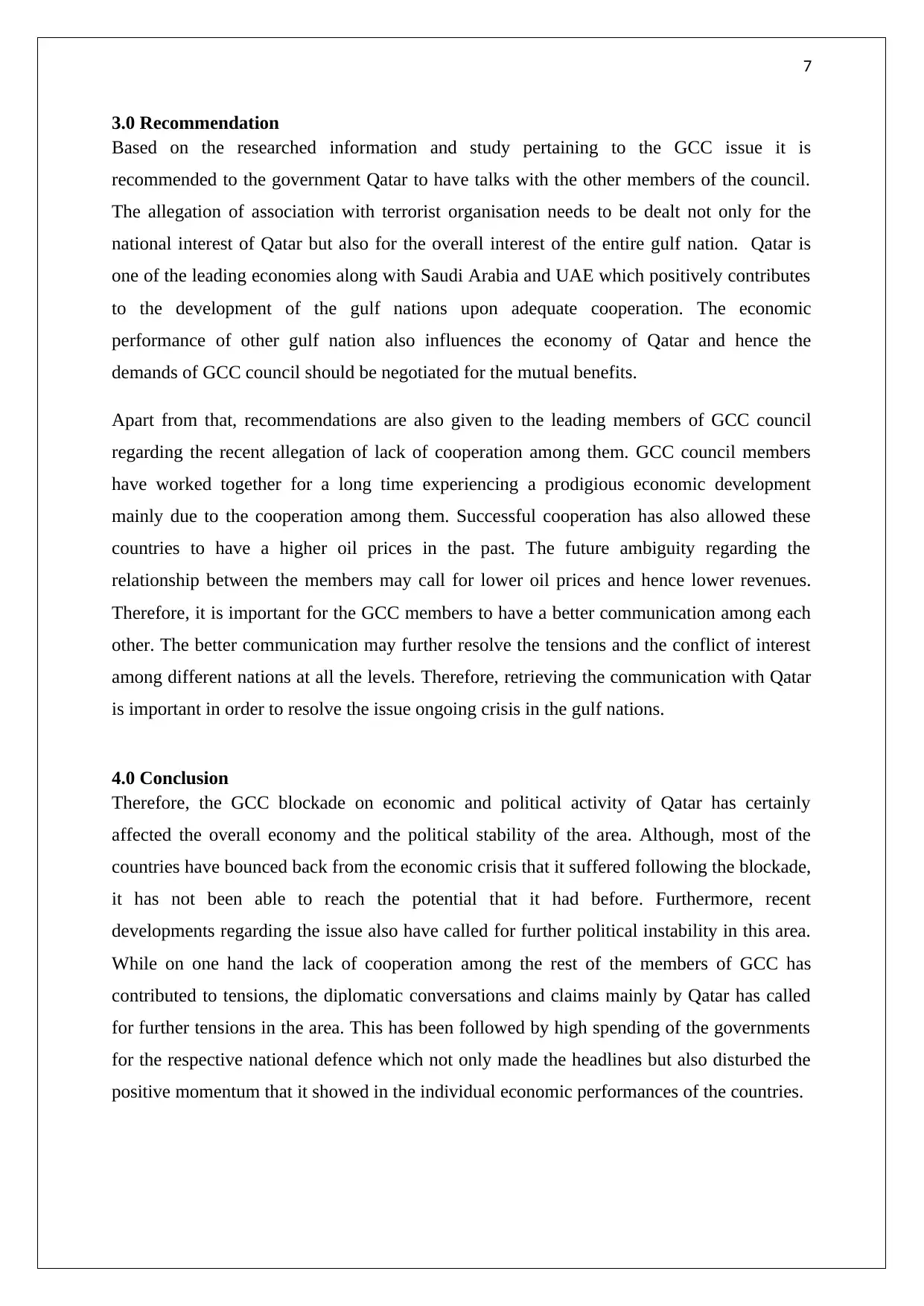
7
3.0 Recommendation
Based on the researched information and study pertaining to the GCC issue it is
recommended to the government Qatar to have talks with the other members of the council.
The allegation of association with terrorist organisation needs to be dealt not only for the
national interest of Qatar but also for the overall interest of the entire gulf nation. Qatar is
one of the leading economies along with Saudi Arabia and UAE which positively contributes
to the development of the gulf nations upon adequate cooperation. The economic
performance of other gulf nation also influences the economy of Qatar and hence the
demands of GCC council should be negotiated for the mutual benefits.
Apart from that, recommendations are also given to the leading members of GCC council
regarding the recent allegation of lack of cooperation among them. GCC council members
have worked together for a long time experiencing a prodigious economic development
mainly due to the cooperation among them. Successful cooperation has also allowed these
countries to have a higher oil prices in the past. The future ambiguity regarding the
relationship between the members may call for lower oil prices and hence lower revenues.
Therefore, it is important for the GCC members to have a better communication among each
other. The better communication may further resolve the tensions and the conflict of interest
among different nations at all the levels. Therefore, retrieving the communication with Qatar
is important in order to resolve the issue ongoing crisis in the gulf nations.
4.0 Conclusion
Therefore, the GCC blockade on economic and political activity of Qatar has certainly
affected the overall economy and the political stability of the area. Although, most of the
countries have bounced back from the economic crisis that it suffered following the blockade,
it has not been able to reach the potential that it had before. Furthermore, recent
developments regarding the issue also have called for further political instability in this area.
While on one hand the lack of cooperation among the rest of the members of GCC has
contributed to tensions, the diplomatic conversations and claims mainly by Qatar has called
for further tensions in the area. This has been followed by high spending of the governments
for the respective national defence which not only made the headlines but also disturbed the
positive momentum that it showed in the individual economic performances of the countries.
3.0 Recommendation
Based on the researched information and study pertaining to the GCC issue it is
recommended to the government Qatar to have talks with the other members of the council.
The allegation of association with terrorist organisation needs to be dealt not only for the
national interest of Qatar but also for the overall interest of the entire gulf nation. Qatar is
one of the leading economies along with Saudi Arabia and UAE which positively contributes
to the development of the gulf nations upon adequate cooperation. The economic
performance of other gulf nation also influences the economy of Qatar and hence the
demands of GCC council should be negotiated for the mutual benefits.
Apart from that, recommendations are also given to the leading members of GCC council
regarding the recent allegation of lack of cooperation among them. GCC council members
have worked together for a long time experiencing a prodigious economic development
mainly due to the cooperation among them. Successful cooperation has also allowed these
countries to have a higher oil prices in the past. The future ambiguity regarding the
relationship between the members may call for lower oil prices and hence lower revenues.
Therefore, it is important for the GCC members to have a better communication among each
other. The better communication may further resolve the tensions and the conflict of interest
among different nations at all the levels. Therefore, retrieving the communication with Qatar
is important in order to resolve the issue ongoing crisis in the gulf nations.
4.0 Conclusion
Therefore, the GCC blockade on economic and political activity of Qatar has certainly
affected the overall economy and the political stability of the area. Although, most of the
countries have bounced back from the economic crisis that it suffered following the blockade,
it has not been able to reach the potential that it had before. Furthermore, recent
developments regarding the issue also have called for further political instability in this area.
While on one hand the lack of cooperation among the rest of the members of GCC has
contributed to tensions, the diplomatic conversations and claims mainly by Qatar has called
for further tensions in the area. This has been followed by high spending of the governments
for the respective national defence which not only made the headlines but also disturbed the
positive momentum that it showed in the individual economic performances of the countries.
Paraphrase This Document
Need a fresh take? Get an instant paraphrase of this document with our AI Paraphraser
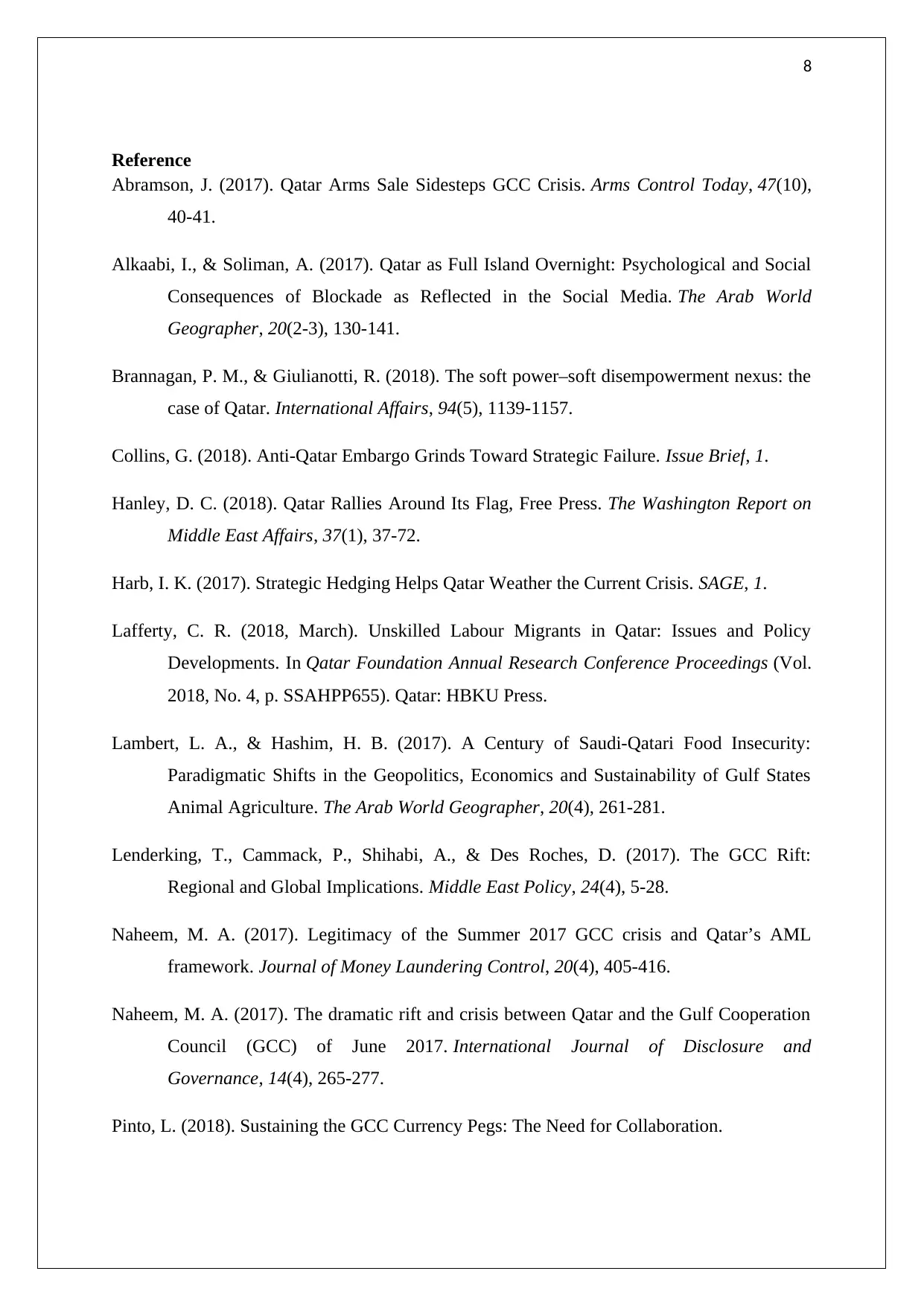
8
Reference
Abramson, J. (2017). Qatar Arms Sale Sidesteps GCC Crisis. Arms Control Today, 47(10),
40-41.
Alkaabi, I., & Soliman, A. (2017). Qatar as Full Island Overnight: Psychological and Social
Consequences of Blockade as Reflected in the Social Media. The Arab World
Geographer, 20(2-3), 130-141.
Brannagan, P. M., & Giulianotti, R. (2018). The soft power–soft disempowerment nexus: the
case of Qatar. International Affairs, 94(5), 1139-1157.
Collins, G. (2018). Anti-Qatar Embargo Grinds Toward Strategic Failure. Issue Brief, 1.
Hanley, D. C. (2018). Qatar Rallies Around Its Flag, Free Press. The Washington Report on
Middle East Affairs, 37(1), 37-72.
Harb, I. K. (2017). Strategic Hedging Helps Qatar Weather the Current Crisis. SAGE, 1.
Lafferty, C. R. (2018, March). Unskilled Labour Migrants in Qatar: Issues and Policy
Developments. In Qatar Foundation Annual Research Conference Proceedings (Vol.
2018, No. 4, p. SSAHPP655). Qatar: HBKU Press.
Lambert, L. A., & Hashim, H. B. (2017). A Century of Saudi-Qatari Food Insecurity:
Paradigmatic Shifts in the Geopolitics, Economics and Sustainability of Gulf States
Animal Agriculture. The Arab World Geographer, 20(4), 261-281.
Lenderking, T., Cammack, P., Shihabi, A., & Des Roches, D. (2017). The GCC Rift:
Regional and Global Implications. Middle East Policy, 24(4), 5-28.
Naheem, M. A. (2017). Legitimacy of the Summer 2017 GCC crisis and Qatar’s AML
framework. Journal of Money Laundering Control, 20(4), 405-416.
Naheem, M. A. (2017). The dramatic rift and crisis between Qatar and the Gulf Cooperation
Council (GCC) of June 2017. International Journal of Disclosure and
Governance, 14(4), 265-277.
Pinto, L. (2018). Sustaining the GCC Currency Pegs: The Need for Collaboration.
Reference
Abramson, J. (2017). Qatar Arms Sale Sidesteps GCC Crisis. Arms Control Today, 47(10),
40-41.
Alkaabi, I., & Soliman, A. (2017). Qatar as Full Island Overnight: Psychological and Social
Consequences of Blockade as Reflected in the Social Media. The Arab World
Geographer, 20(2-3), 130-141.
Brannagan, P. M., & Giulianotti, R. (2018). The soft power–soft disempowerment nexus: the
case of Qatar. International Affairs, 94(5), 1139-1157.
Collins, G. (2018). Anti-Qatar Embargo Grinds Toward Strategic Failure. Issue Brief, 1.
Hanley, D. C. (2018). Qatar Rallies Around Its Flag, Free Press. The Washington Report on
Middle East Affairs, 37(1), 37-72.
Harb, I. K. (2017). Strategic Hedging Helps Qatar Weather the Current Crisis. SAGE, 1.
Lafferty, C. R. (2018, March). Unskilled Labour Migrants in Qatar: Issues and Policy
Developments. In Qatar Foundation Annual Research Conference Proceedings (Vol.
2018, No. 4, p. SSAHPP655). Qatar: HBKU Press.
Lambert, L. A., & Hashim, H. B. (2017). A Century of Saudi-Qatari Food Insecurity:
Paradigmatic Shifts in the Geopolitics, Economics and Sustainability of Gulf States
Animal Agriculture. The Arab World Geographer, 20(4), 261-281.
Lenderking, T., Cammack, P., Shihabi, A., & Des Roches, D. (2017). The GCC Rift:
Regional and Global Implications. Middle East Policy, 24(4), 5-28.
Naheem, M. A. (2017). Legitimacy of the Summer 2017 GCC crisis and Qatar’s AML
framework. Journal of Money Laundering Control, 20(4), 405-416.
Naheem, M. A. (2017). The dramatic rift and crisis between Qatar and the Gulf Cooperation
Council (GCC) of June 2017. International Journal of Disclosure and
Governance, 14(4), 265-277.
Pinto, L. (2018). Sustaining the GCC Currency Pegs: The Need for Collaboration.
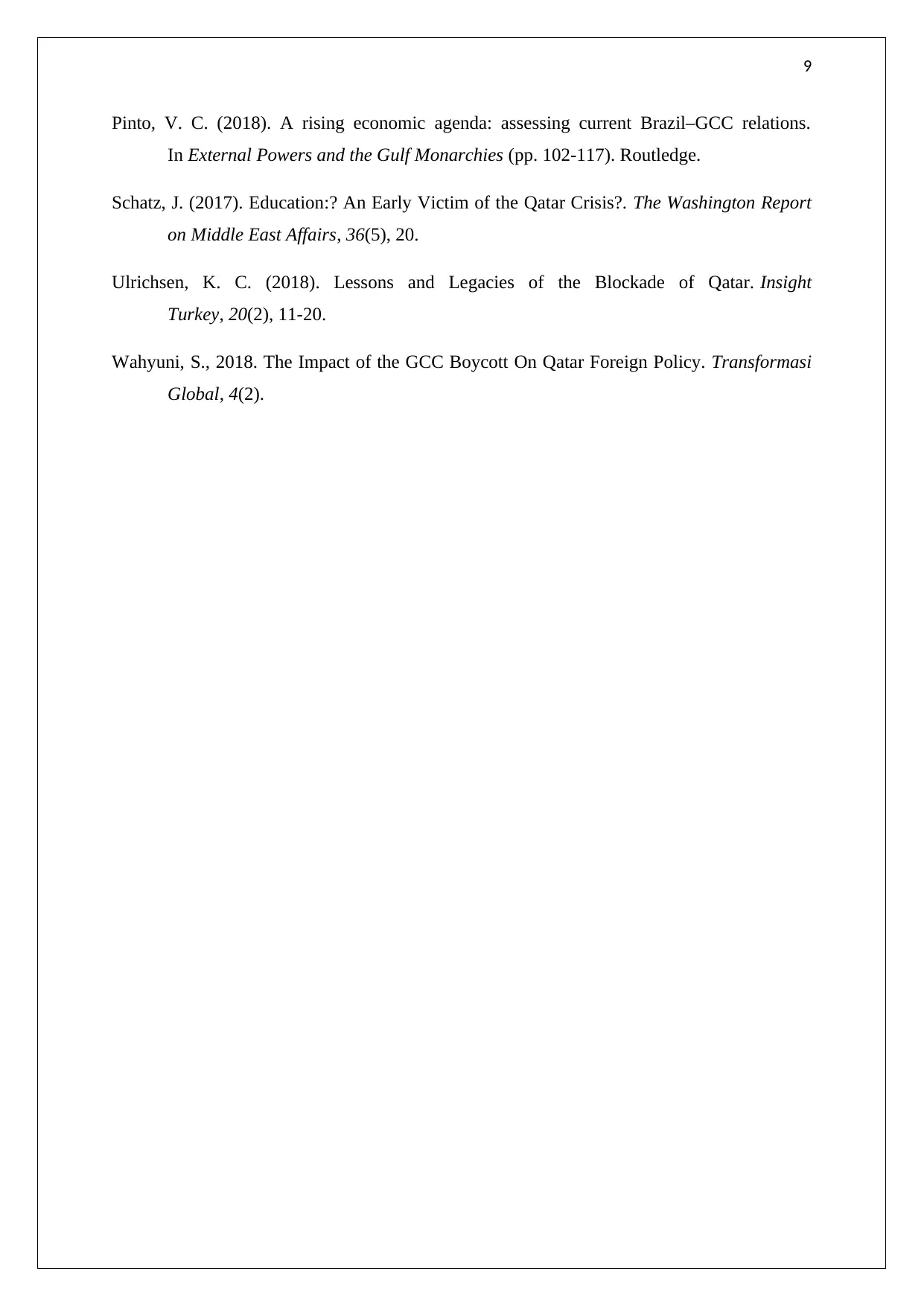
9
Pinto, V. C. (2018). A rising economic agenda: assessing current Brazil–GCC relations.
In External Powers and the Gulf Monarchies (pp. 102-117). Routledge.
Schatz, J. (2017). Education:? An Early Victim of the Qatar Crisis?. The Washington Report
on Middle East Affairs, 36(5), 20.
Ulrichsen, K. C. (2018). Lessons and Legacies of the Blockade of Qatar. Insight
Turkey, 20(2), 11-20.
Wahyuni, S., 2018. The Impact of the GCC Boycott On Qatar Foreign Policy. Transformasi
Global, 4(2).
Pinto, V. C. (2018). A rising economic agenda: assessing current Brazil–GCC relations.
In External Powers and the Gulf Monarchies (pp. 102-117). Routledge.
Schatz, J. (2017). Education:? An Early Victim of the Qatar Crisis?. The Washington Report
on Middle East Affairs, 36(5), 20.
Ulrichsen, K. C. (2018). Lessons and Legacies of the Blockade of Qatar. Insight
Turkey, 20(2), 11-20.
Wahyuni, S., 2018. The Impact of the GCC Boycott On Qatar Foreign Policy. Transformasi
Global, 4(2).
⊘ This is a preview!⊘
Do you want full access?
Subscribe today to unlock all pages.

Trusted by 1+ million students worldwide
1 out of 9
Related Documents
Your All-in-One AI-Powered Toolkit for Academic Success.
+13062052269
info@desklib.com
Available 24*7 on WhatsApp / Email
![[object Object]](/_next/static/media/star-bottom.7253800d.svg)
Unlock your academic potential
Copyright © 2020–2025 A2Z Services. All Rights Reserved. Developed and managed by ZUCOL.




